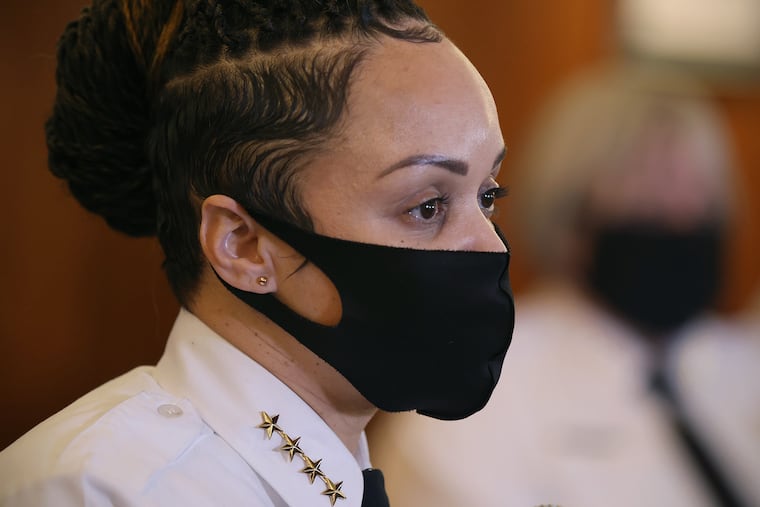When Danielle Outlaw was chief in Portland, Ore., police ‘escalated tensions’ by using force against protesters, report finds
The report is the third to be released in recent weeks evaluating Outlaw’s leadership regarding large-scale protests.

A new report detailing how police in Portland, Ore., responded to a series of protests several years ago, including under then-chief Danielle Outlaw, said the agency’s use of pepper spray and flash-bang grenades “unintentionally escalated tensions with the crowd” and “deepened community mistrust in the police.”
The 106-page report, written by the National Police Foundation and released Wednesday, was not explicitly critical of Outlaw, who accepted the job to become Philadelphia’s top cop at the end of 2019 with a promise to improve police-community relations. In other portions of the document, the authors also credit her with improving tactical aspects of the Portland Police Bureau’s response to the second high-profile demonstration she oversaw there, in 2019.
Still, the report is the third to be released in recent weeks evaluating Outlaw’s leadership during large-scale protests. Two reports analyzing the Philadelphia Police Department’s response to last summer’s demonstrations over the police killing of George Floyd in Minneapolis said her department was unprepared for mass protests that grew unruly, spanned several days, and featured aggressive tactics by police that demonstrators said contributed to the unrest.
The second report, commissioned by the City Controller’s Office and released late last month, said Outlaw had sought to use force including tear gas against protesters before other members of Mayor Jim Kenney’s administration ultimately came to agree. Kenney has since said he regrets the use of gas against protesters — which in one instance wafted into residential West Philadelphia as police confronted unrest in the nearby commercial corridor.
After the controller’s report was released, Outlaw held a news conference to defend herself and her leadership, and Kenney said she had his “full support.”
The Police Department did not respond to a request for comment Wednesday. But the Mayor’s Office reiterated Kenney’s backing of Outlaw.
City spokesperson Mike Dunn said Kenney’s “confidence in the commissioner has not wavered,” and that city officials reviewed Outlaw’s tenure in Portland during her recruitment and interview process, finding that she had overseen the implementation of effective crime-fighting strategies; helped reform use-of-force policies under a federal consent decree; and that Portland police had received “national and international recognition for work in community trust-building, crowd management response, and constitutional policing.”
“What we found was that Commissioner Outlaw’s tenure in Portland was exemplary,” Dunn said.
The report released Wednesday is notably restrained in the language it uses to recount three protests that occurred there in recent years: one in 2017, before Outlaw took over, and one each in 2018 and 2019, when Outlaw was chief. In the report’s initial pages, its authors said they did not intend to “assign blame or criticize, but to contribute to continual evaluation and evolution” of how Portland police respond to protests.
The report largely declines to draw conclusions about allegations of bias by police that made national headlines when the protests occurred. Left-leaning demonstrators claimed that officers had been overly aggressive in using force against them but not protesters from the political right, while conservative commentators later said police had favored antifa demonstrators and allowed them to assault well-known activist Andy Ngo.
The first protest covered in the report that occurred when Outlaw was chief happened on Aug. 4, 2018, when far-right extremists with the Patriot Prayer and Proud Boys clashed with antifascist counterprotesters downtown. The report said that when officers believed counterprotesters were damaging police cars and throwing rocks and bottles, police began using less-than-lethal munitions, including “stinger rounds” and pepper spray.
Four people were arrested and three were injured, according to the report, which also said that an unspecified number of protesters filed lawsuits over injuries they attributed to police.
In the days that followed the protest, Outlaw was criticized for comparing counterprotesters who had complained about being assaulted by officers to kids who had lost in a schoolyard brawl.
“I tell you, ‘Meet me after school at 3:00. Right? We’re gonna fight,’ ” Outlaw told Portland radio host Lars Larson. “And I come with the intention to fight. And then you get mad because I kicked your butt. And then you go back and you wail off and whine and complain.”
The report said Outlaw’s comments “angered some community members and led some to raise questions about the credibility of [the department’s] internal review of tactics used during the event.”
A year later, on Aug. 17, 2019, far-right protesters including the Proud Boys again organized a rally downtown, the report said. Police that time were more successful in keeping that group separated from a collection of counterprotesters, and the report said that although some demonstrators still complained of bias by police — and although 13 people were arrested and six suffered minor injuries — “overall public feedback on the police response has been largely positive.” No lawsuits were filed over the police response to the protest, the report said.
The report also credited Outlaw with helping increase coordination between other regional law enforcement agencies ahead of the demonstration. That level of support was “uncommon” in Portland, the report said, and it contributed to a more organized response.
Staff writer Anna Orso contributed to this article.